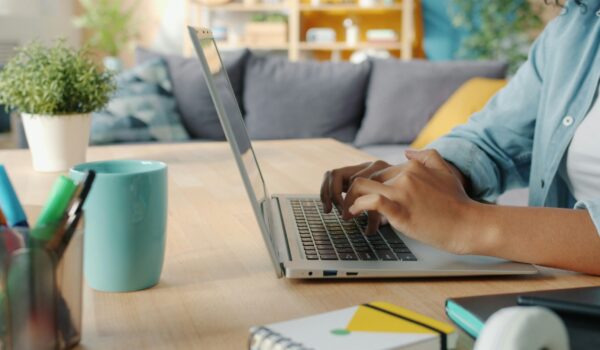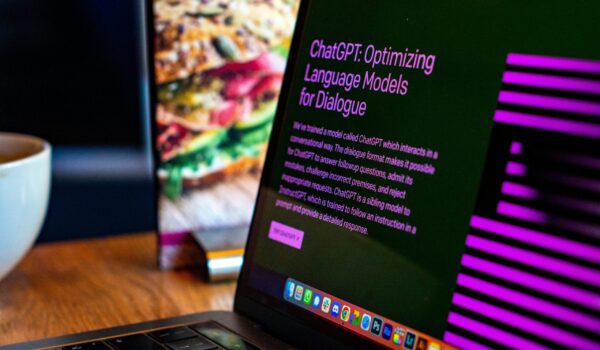
The Influences of Social Media on Students: The Good, The Bad, and Everything in Between
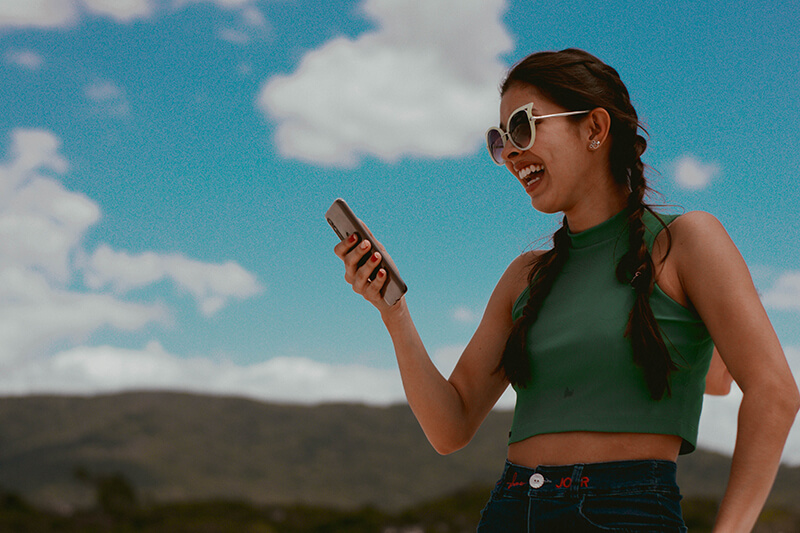 We hear a lot about the influences of social media, both good and bad, but we don’t often hear about how social media impacts students in particular.
We hear a lot about the influences of social media, both good and bad, but we don’t often hear about how social media impacts students in particular.
Social media often gets a bad reputation for producing an online culture of social proof, privacy concerns, and pushing false narratives. However, there are so many great things that come with social media that often get overlooked.
Every aspect of our day-to-day lives is ingrained within social media and app culture. Over the last year, this has been even more pressing as everyone around the world collectively turned to social media to get through the COVID-19 pandemic. For students in particular, social media has been integral to surviving online classes, staying connected with friends, and more.
As social media users ourselves, we thought it would be fair to go over the influences of social media on the day-to-day lives of students in terms of both the positives and the negatives.
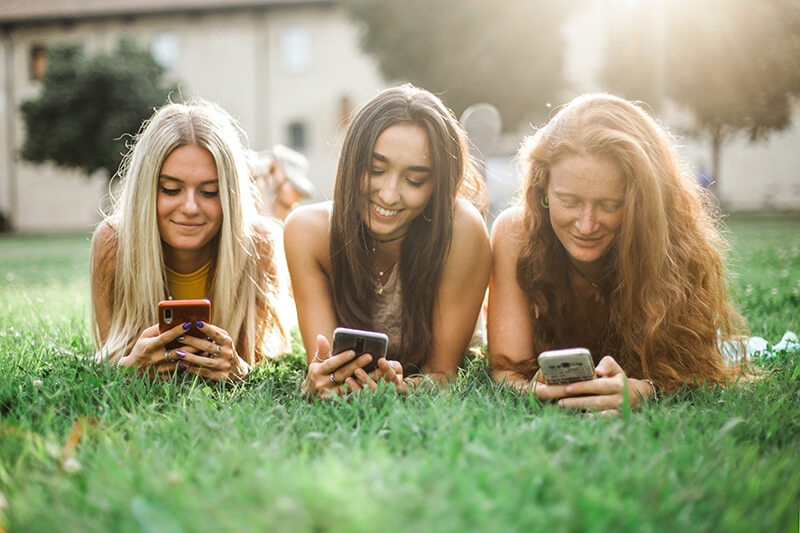
The Good: Strengthening Interpersonal Relationships
Perhaps one of the best positive influences of social media is the ability for people to maintain friendships and interpersonal relationships no matter where they are in the world. There are tons of great apps out there that allow you to video chat with friends and keep up with each others’ day-to-day lives, so it’s easy to feel like you’re still in the loop even when you’re apart.
This is also a great tool for those who are more introverted and shy, and who might have difficulty dealing with social anxiety or connecting with people in person. Behind a screen, you gain a little more confidence and can become comfortable with people before you have to be in an intimidating social situation.
Another great factor is the value of social media for first year or freshman students. You can use Facebook groups and Instagram chats to connect with your future roommates or classmates ahead of time. This way, you can make arrangements and get to know people before you arrive on campus so you don’t feel as alone or isolated during your first few weeks. It’s also a great way to make connections with classmates so you can exchange notes, compare your answers, and arrange study groups.
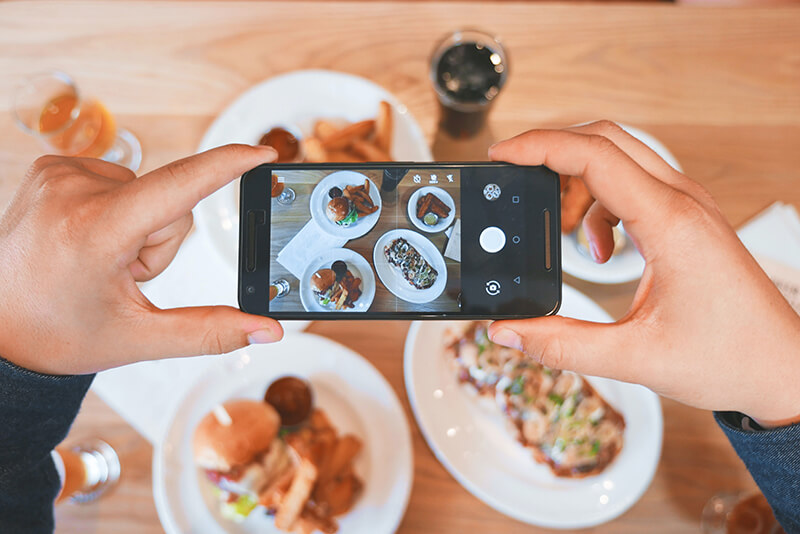
The Bad: The Culture of Social Proof and Clout
Social proof is a psychological theory coined by Robert Cialdini that states that people who don’t know how to behave in a particular social situation will imitate or mimic the actions of others in order to fit in properly. Some people also refer to this as social influence or copycat behaviour.
In some situations, the concept of social proof or copycat behaviour can be a great thing. When people see someone, like a celebrity or popular influencer, doing something that helps people or does good, they want to do the same things. For example, actress Jameela Jamil uses her celebrity status to promote body positivity through her iWeigh campaign.
There are some situations where people may choose to do things solely for the sake of gaining attention or popularity on social media. When those things are good or even just harmless, people tend to receive praise. For example, many people like to photograph their food for the sake of getting Instagram likes, which doesn’t really hurt anyone.
However, social proof can lead to damaging and reckless behaviour, and can lead people to do harmful things for the sake of collecting online clout. Social clout is essentially the amount of influence, fame, status, or power someone has. When you begin to measure your own success based on something superficial like this, it can be damaging to your perception of yourself and others. Not only that, but it’s a lot easier to make poor decisions based on this.
Some studies have linked social proof and social media with the tragic phenomena of copycat suicide, and in other cases this behaviour can lead to dangerous trends. The infamous Tide Pod trend that rose from TikTok ended up putting users at risk for serious health consequences, while a newer TikTok challenge that saw teens consuming large amounts of Benadryl actually resulted in at least one death by overdose.
The Good: Building and Connecting Communities
As a community building tool, social media is almost unmatched. Through a social media platform, you can make connections and meet people from around the world who have gone through the problems you face and can guide you through difficult times.
In many cases, people who feel marginalized within their society or community are able to connect with others in the same circumstances as them through online support groups. For example, if you suffer from severe public speaking anxiety, you can join an online Toastmasters group. If you are experiencing marginalization as part of the LGBTQ2+ community, you can find a social media support group and speak to people who have been in your shoes and have great life advice to share.
At Homework Help Global, we even have our own online English learning community on Facebook where people from around the world can connect and learn English together with the support of our team. This way, people can support one another and don’t need to go through the trouble of meeting people within the limitations of their own offline community.
Your college or university likely has its own community support groups online, whether they’re through Facebook or any other social media platform. These groups can help you connect with other students, find support resources such as counsellors and academic advisors, and learn about upcoming events.
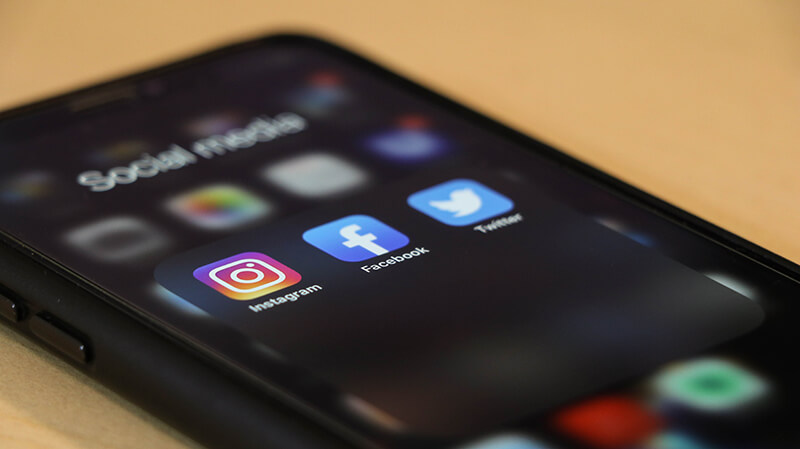
The Bad: Study Distractions
Let’s face it – social media is a big distraction that can have a negative impact on your productivity. We all know this, and we all do this often.
It’s so easy to be tempted to open your SnapChat app or browse through TikTok and end up down a rabbit hole that takes up hours of your time. But when you do this in the middle of a class or in the middle of a major essay, you’re going to find you’ve wasted a lot of time you could have been focused on absorbing information or getting your projects done.
Social media can get in the way of your productivity for these reasons. Checking your phone quickly in class might mean you lose a very important part of the lecture, and playing YouTube videos while you’re studying will take away your focus so you won’t effectively remember your notes. However, some people simply can’t just turn their phone off and put it away for the fear that they’ll miss something important because they become absorbed in social media. If you can’t put your phone away or on airplane mode for a few hours, you may be using it too much.
If you need to crack down on your studying habits and turn off those distractions, try some of the tips in our ultimate study guide. We share some great tips and advice for you to finally put that phone down and get motivated to ace those tests, assignments, and exams.
The Good and Bad: Online Dating Through Social Media
In today’s world, social media also plays a big role in online dating. On one hand, social media makes online dating easy through apps such as Tinder, Bumble, Hinge, and Match. This can open up a lot of doors when it comes to meeting someone you may never have had the chance to meet in person. It also eliminates a lot of that social anxiety that comes with trying to approach someone in public.
However, online dating on social media comes with its share of downsides. For starters, anyone can pretend to be someone they’re not in order to trick people into thinking they’ve met someone they really connect with. This is where that catfishing comes into play, as criminals can easily log on to an app like Tinder and find someone to target.
Ultimately, as long as you follow the basic rules of common sense when using social media for dating or finding relationships, you will be okay. Here are some basic rules to follow to keep yourself safe and enjoy meeting new people:
● Meet people for the first time in a public, neutral location such as a coffee shop.
● Never give out personal information such as addresses on a public social media platform.
● If you can, make your first date a group hang out.
● Have a backup plan in place (like a friend on standby who can come get you if things take a negative turn).
● Do your due diligence and try to Google someone before you meet them in person to make sure they are who they say they are.
● Avoid involving alcohol that might lower your inhibitions and make you more vulnerable (or cause you to do something embarrassing).
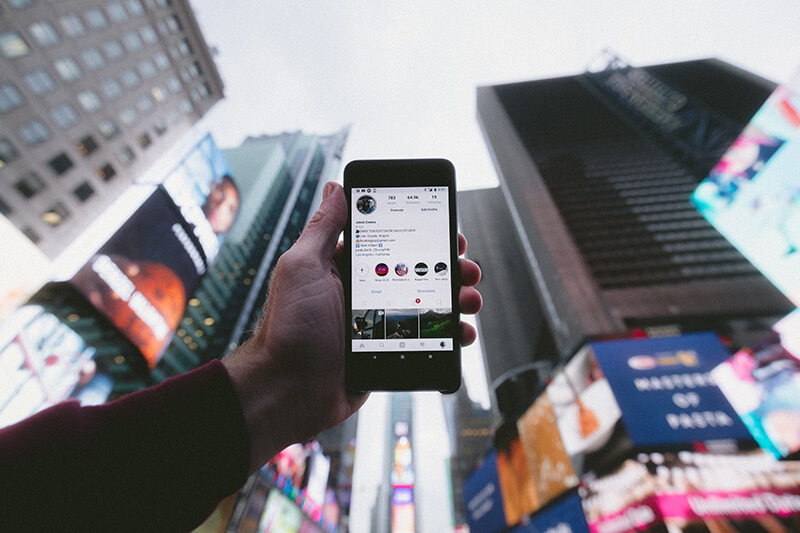
The Good: The Power of Collective Action
In terms of good influences of social media, the power of collective action is a big one. Social media allows people to connect with people all over the world and unite together for causes they believe in, with the reach that was never even heard of in the past.
Just think about how the Black Lives Matter movement was able to grab international attention this past summer. People around the world got involved and led their own protests in solidarity in other countries, while more people were able to understand what was happening and educate themselves on issues they may never have been aware of beforehand.
Social media is also an effective way to arrange events like protests and marches, like the Women’s March. During the Civil Rights Movement and the Women’s Rights Movements in the 20th century, people had to use limited means such as letters, flyers, newspapers, and telephone networks in order to let people know that events were happening. Often, this was very limiting as it was difficult to reach people who lived outside of your own community. Nowadays, you can reach ten times as many people by creating a Facebook event and having everyone who cares share it to their own networks.
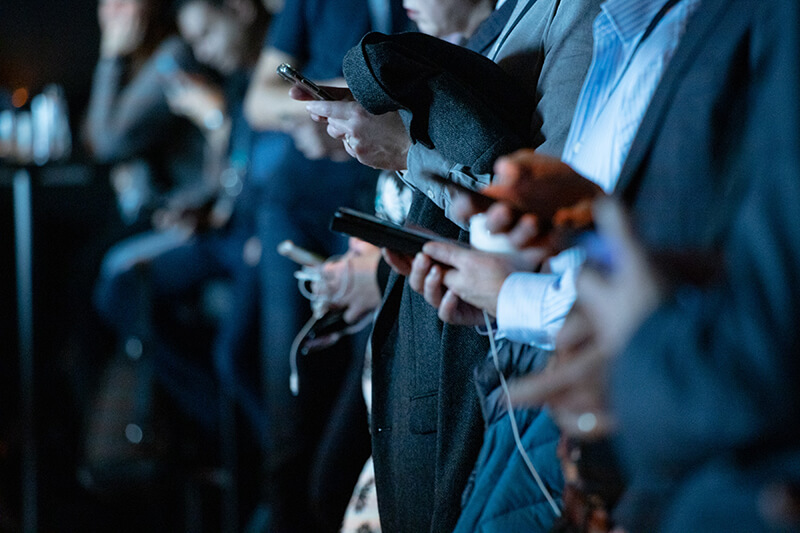
The Bad: Social Displacement
One of the most negative influences of social media is the psychological theory of social displacement. The theory of social displacement states that the more you use social media, the less time you spend socializing in the real world. This can lead to a negative impact on your life.
When you start to become absorbed in social media, there is a chance you may become so absorbed you miss the world happening around you. How many times have you been to a concert and saw everyone in the crowd watching it through their phone screen instead of living in the moment and enjoying it live? Or perhaps you’ve been to a house party where that one guest was sitting on the couch scrolling through their Instagram feed instead of having rewarding conversations with other guests. This might even mean that you check your notifications constantly when you make a new social media post waiting for the comments, likes, and reactions to roll in.
When you start to let social media dictate how you live your life, you begin to distance yourself from the experiences of the world around you. This can lead to a distanced experience of reality and less real social interactions, which are vital to your mental health and wellbeing.
The good news is that you don’t need to go into panic mode just yet. There are conflicting psychological studies on social displacement theory, with some researchers arguing that there’s no evidence this occurs at all, and others arguing that it is valid. Either way, whether social displacement theory is real or not, it’s always a good idea to catch yourself when you spend too much time on your phone and motivate yourself to live more in the moment.
The Good: Long Distance? Not a Problem!
When you go to university, you’re going to meet a lot of different people from different places around the country and even from across the world. That means you’re going to create some amazing relationships and friendships that will last a lifetime.
You’re about to spend the next four or more years sharing life experiences and growing as a person alongside some very special people who share the same interests and passions as you. Everyone is at a similar stage in their life, and those experiences are pivotal in shaping the person you become later on.
But what happens when those amazing friends you make have to move back home after graduation? You’re no longer able to simply knock on their door or meet up with them for a study date. That’s where social media comes in. With apps like WhatsApp, Facebook video chat, SnapChat, and Instagram, you can easily stay in contact with your friends and stay updated on their lives long after you leave school. You can even use social media to score great deals on travel packages so you can go and visit your friends in the future!

The Bad: False Identities and Manipulation
Another damaging factor that is frequently seen on social media is the manipulation and fabrication of images and identities. With tools like Instagram filters, editing apps, Photoshop, and green screens, users can create images and edit them to alter the way they look online. This allows people to gain confidence and create an identity for themselves, but more often than not, this can lead to false impressions and manipulation.
For example, in the midst of the COVID-19 pandemic, a studio in Los Angeles became a topic of discussion when it was revealed that some social media influencers were renting out a studio decorated to look like a private jet to take photos to post online. The influencers were captioning their posts with words that made it seem like they were really travelling, when they were actually renting out a studio for $65 USD an hour. When this began to go viral, other social media users started pointing out some of the other “tricks” influencers were doing to fake their images, such as grabbing extra shopping bags to make it appear as though they were on a shopping spree.
There are multiple reasons why false identities are one of the biggest negative influences of social media. Firstly, there is a deep psychological impact. Some studies have found that excessive or prolonged social media use can lead to mental health issues such as feelings of low self-worth, inadequacy, isolation, depression and anxiety, low self-esteem, and fear of missing out. When you see images of other people living their best lives and posting perfectly edited photos, it’s easy to begin to feel like you aren’t as attractive or that your life isn’t as good as someone else’s.
Secondly, this could pose a serious danger through the concept of catfishing, a tactic used by people online to lure others by pretending to be someone they aren’t. Sadly, this is commonly used by child predators to lure children into their grasp, but it can also happen with online relationships and people tricking others by placing them in harmful situations under the guise of deception.
The Good and Bad: Easy Information Sharing
Another one of the equally good and bad influences of social media is the ease with which users can share information instantly. With just one tap of a finger, you can share the latest updates and breaking news with your friends, family, and colleagues in seconds. This keeps everyone in the loop and ensures that urgent information is distributed as fast as possible to as many people as possible.
Not everyone reads newspapers anymore or watches mainstream news channels in real time. Even then, newspapers and news shows are only shown once a day, so if breaking news occurs, sometimes people don’t find out the traditional way until the next day. Social media allows people to absorb information on their own time, and in situations where the news is urgent, this is extremely helpful. For example, if a child goes missing and an Amber Alert is issued, social media allows the alert to be shared to many people instantly so the search can begin as early as possible.
Easy information sharing comes with its own disadvantages though. In the last few years, politics in the United States have begun to bring more prominence to the term “fake news.” Satirical websites such as The Beaverton and The Onion are entertaining to read, but sometimes they get shared by people who don’t realize that this content is not real news. It’s also very easy to fabricate news and spread it across social media in order to trick people into believing something that isn’t true.
Further, social media also makes it easy to spread information about unfounded conspiracy theories that could actually cause harm or put people in danger. One recent example of this was the theory that originated on the social media platform Reddit that claimed people were trafficking children through furniture sold on Wayfair. While people were genuinely concerned (rightfully so) about children being exploited, they shared images of missing children who happened to have similar names to the furniture. Some of these missing children had already been found at the time the theory went viral, and the children’s names and addresses were now being shared with everyone all over the world, compromising their privacy and safety.
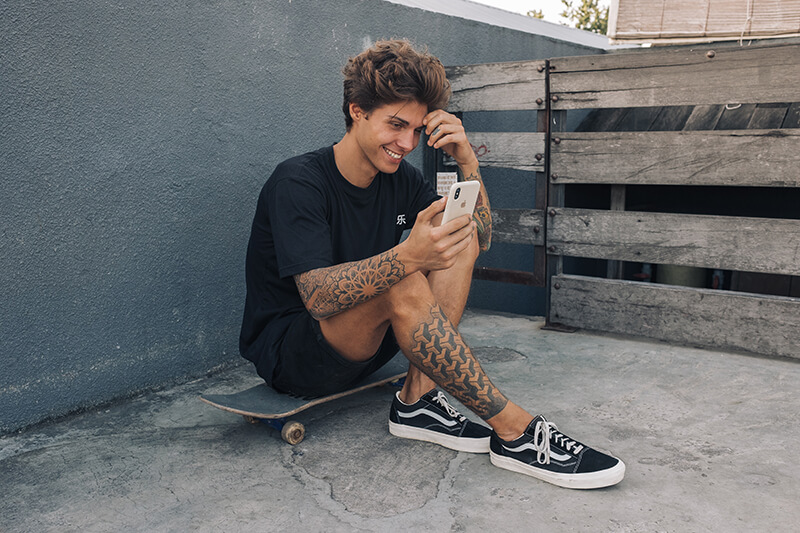
The Good: Social Media Marketing
As a student, taking a program or course in social media marketing is a great way to blend your love of social media platforms with a promising career that likely won’t taper off anytime soon. There are always going to be opportunities within social media marketing, and if you enjoy doing it, you will love working in digital marketing.
If you’re planning on becoming an entrepreneur or running your own business, you’re going to need to take advantage of the benefits of social media marketing in your own company. With a higher return on investment (ROI) than traditional marketing, social media is an excellent and essential way to make sure your business gets the traction and attention it needs to grow and flourish.
Looking for some help tailoring your resume for a social media marketing position? We can help with that! Check out our resume writing services for professional support that will help you get your foot in the door for any career.
Another way students can use social media marketing for their own benefit is by using it to become an influencer or create an online presence. If you want some great tips on doing this for yourself, check out our Student Influencers Podcast interview with Nathalee Pauline! Nathalee is an influencer in Toronto, Ontario who shared some tips on becoming an influencer yourself.
The Bad: Online Bullying
Over the last decade, online cyberbullying has become a serious problem among teenagers and young people. Social media unfortunately makes it easier for students and young people to attack one another and foster hateful or mean messages that damage the victim’s mental health. Basically, social media makes it even easier for bullies to attack people without even leaving their home, and getting caught is harder as well.
Here are some examples of cyberbullying you may have even experienced already:
● Catfishing
● Trolling people
● Leaving insulting comments on someone’s post
● Cyberstalking
● Harassment in any form
● Outing someone for something they are not ready to be public about
● Pretending to be someone and posting incriminating things about them
● Excluding someone or going out of your way to make sure they feel excluded
These behaviours can be extremely damaging on young, impressionable teenagers and students. They can lead to substance abuse issues, social anxiety, depression, and worse – suicide. In 2017, a young girl from New Jersey committed suicide after experiencing nine months of intense cyberbullying from her peers. She was only 14 years old. This is just one of the many examples of young teens (and even younger children) turning to suicide as the only way to escape the devastating effects of bullies. These tragic circumstances are completely avoidable and have serious repercussions for families and loved ones.
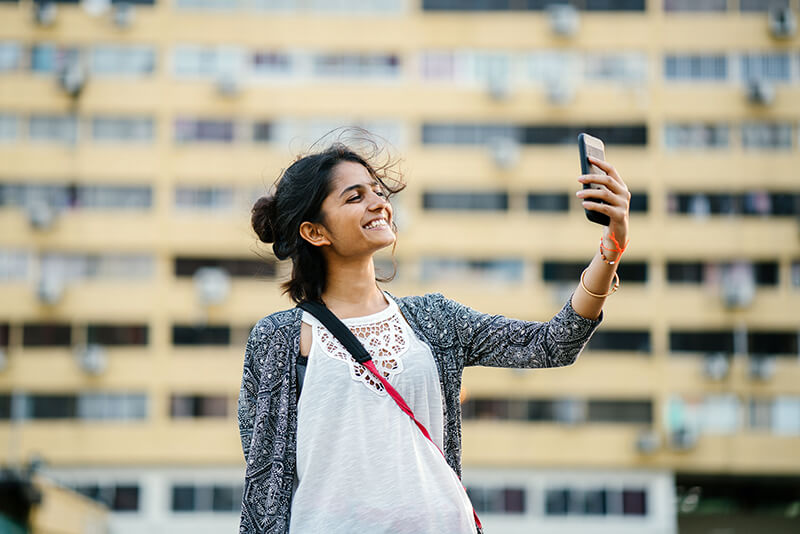
The Good: Social Media Influencers
Social media influencers are becoming the new modern day celebrities. From creating content online for entertainment purposes to scoring deals with major brands, influencers are changing the way people look at celebrities and fame.
Depending on who you talk to, some may argue that the culture of social media influencers isn’t all that great. You often see stories about influencers making extravagant requests from businesses or creating fake images for clout, or labelling their efforts as “not a real job.”
But the reality is that for every influencer who pushes their limits, there are plenty more who do amazing things in the world. Influencers have the ability to spread education, offer support and advice to other students, and so much more. Many of these influencers use their personal experiences to help other people learn lessons, get through difficult circumstances, and learn about new products or services within their niche.
Influencers also have the ability to reach audiences in a more personal way instead of branded social media accounts or ads. This is why influencers are often used in social media marketing to reach audiences that are more likely to listen to word of mouth testimony than read an ad. The country of Finland leveraged this idea at the onset of the COVID-19 pandemic, when the Finnish government enlisted influencers to share news and information about COVID-19 in order to reach a wider audience that wasn’t paying attention to mainstream media.
To hear from some social media influencers who have a lot of helpful insights to share for students, check out the Homework Help Show Student Influencers Podcast! Each episode, we talk to students and alumni and get them to share their stories, their best advice, and more to help students get answers, seek advice, and feel more motivated to succeed.
The Bad: Privacy Concerns
When you post so much about your life on a public space like a social media app, you’re going to encounter some privacy issues. Some people are perfectly fine with the world knowing details about their day-to-day lives, while others prefer to stay away from oversharing and keep their own privacy.
Beyond simply oversharing details about your life online, concerns about invasions of privacy on social media have risen over the last few years. Of course, the big concerns involve identity theft, account hacking, and phishing attempts by criminals and scammers. Any time you put personal information in your profile, hackers can use it to access your personal accounts such as bank accounts. If you have questions set up with secret answers for logging in, hackers can answer those questions using your personal information if you have that set up. These privacy concerns are present with anything that involves the Internet, so social media isn’t any different.
Data mining is another big privacy issue for many people who use social media apps, as these apps often collect user data and share it to third party platforms. Most of the time, this data is used for social media marketing purposes to understand consumer behaviours and properly target ads. However, many apps have come under fire for not disclosing the information they share or how they share it, and this is where the biggest issues arise.
![]()
The Good: Commerce and Side Hustles
This is not necessarily considered one of the influences of social media, and is more of a benefit, but there are some great opportunities for commerce that students can use to make a little extra cash on the side (and help boost that student budget).
Social media is a great way to take on a new side hustle without committing to a steady job with hours that might conflict with your studies. You can make your own hours, collect extra cash that goes straight into your pocket, and share your work with people from anywhere in the world.
Here are some social media platforms and apps with huge side hustle potential:
● Etsy: If you make handcrafted goods, you can use Etsy to create an online store and sell them to buyers around the world.
● Poshmark: On Poshmark, you can sell used and new clothing and home goods to people in your country, and the app provides you with shipping labels to use. Do a big closet cleanout and sell off the clothes you don’t wear anymore, or do a little research and get into thrifting and reselling.
● Uber: If you have a car at school with you, consider becoming a driver with Uber and earn some extra cash through the rideshare app.
● Postmates: Another option you can try if you have a car at school with you is becoming a delivery driver with Postmates.
● TaskRabbit: Whether you’re great at putting IKEA furniture together or just a handy person in general, you can score some extra cash by listing your services on TaskRabbit and helping people out with odd jobs.
● Fiverr: If you have a skill you can freelance with, like music production or graphic design, you can list yourself on Fiverr and pick up some freelance work through the app.
● Creator Apps: You can also stick a little closer to home and become a content creator on YouTube or TikTok and earn cash when you reach a certain creator status using your own personal brand.
Fallen Under the Influences of Social Media and Need Some Help Getting on Track? We’re Here to Help.
Usually if you’re becoming concerned about social media, there’s a reason. Too distracted by social media to finish your assignment? Need to write a paper on the influences of social media? Want some advice on social media apps that will help you be more productive and focused? Regardless of what you need, we can help.
At Homework Help Global, we have a well-rounded team of academic writers, scholars, and professionals who are more than happy to jump in and help you with any assignments, reports, projects, resumes, presentations, or coursework you may need. Whether it’s a report on the impact of social media, a social media marketing project, or just a research paper on the history of social media, we’ve got you covered.
Get a free quote for your next assignment now or fill out our online order form to get your order started as soon as possible.
Share:
